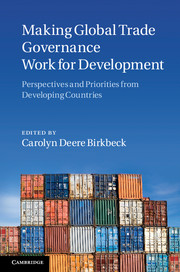 Making Global Trade Governance Work for Development
Making Global Trade Governance Work for Development Book contents
- Frontmatter
- Contents
- Figures
- Tables and boxes
- Contributors
- Acknowledgements
- Introduction
- Part I Global trade governance
- Part II Roles and responsibilities in global trade governance: diversity in developing country priorities and strategies
- Part III Strengthening multilateralism
- Part IV Making WTO negotiations and decision-making processes fairer
- 16 Towards fair and inclusive decision-making in WTO negotiations
- 17 Revisiting the single undertaking
- 18 Enhancing developing country participation in global trade governance through South–South coalitions in the WTO
- 19 Inclusive trade governance
- 20 Global trade governance and development
- Part V Conclusion
- Index
- References
20 - Global trade governance and development
the WTO accession conundrum
from Part IV - Making WTO negotiations and decision-making processes fairer
Published online by Cambridge University Press: 07 September 2011
- Frontmatter
- Contents
- Figures
- Tables and boxes
- Contributors
- Acknowledgements
- Introduction
- Part I Global trade governance
- Part II Roles and responsibilities in global trade governance: diversity in developing country priorities and strategies
- Part III Strengthening multilateralism
- Part IV Making WTO negotiations and decision-making processes fairer
- 16 Towards fair and inclusive decision-making in WTO negotiations
- 17 Revisiting the single undertaking
- 18 Enhancing developing country participation in global trade governance through South–South coalitions in the WTO
- 19 Inclusive trade governance
- 20 Global trade governance and development
- Part V Conclusion
- Index
- References
Summary
The set of non-discriminatory trading rules embedded in World Trade Organization (WTO) agreements has the characteristics of a global public good, and the WTO, as the main institutional framework for global trade governance, has a key role in facilitating an open international trading system. In the United Nations Millennium Declaration the international community committed to ‘develop further an open trading and financial system that is rule-based, predictable, and non discriminatory’ with a view ‘to ensure that globalization becomes a positive force for all the world’s people’ (Millennium Development Goal (MDG) No. 8). Acceding to the WTO implies sharing responsibility in the governance of this global public good. Hence, universal membership of the WTO seems, prima facie, a worthwhile goal.
The WTO, however, faces a dilemma. On one hand, it inherits the old tradition of the General Agreement on Tariffs and Trade (GATT), whereby countries contribute to the objective of promoting trade ‘by entering into reciprocal and mutually advantageous arrangements directed to the substantial reduction of tariffs and other barriers to trade and to the elimination of discriminatory treatment in international commerce’ (Preamble of the GATT 1947 and 1994). In other words, accession to the WTO implies ‘reciprocity’. At the same time, the central position of the WTO in the world trading system and the objective of universal Membership suggests that the ‘cost’ of accession should be kept as low as possible, so as to not exclude the poorest countries. In practice, however, tensions between the WTO’s mercantilist heritage and its role as the institutional vessel for a global public good produce a number of challenges with respect to accession procedures.
- Type
- Chapter
- Information
- Making Global Trade Governance Work for DevelopmentPerspectives and Priorities from Developing Countries, pp. 552 - 576Publisher: Cambridge University PressPrint publication year: 2011
